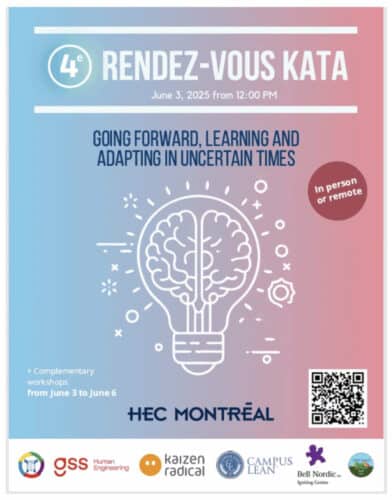Thanks, as always, to Ryan McCormack for this. He always shares so much good reading, listening, and viewing here! Subscribe to get these directly from Ryan via email.
News, articles, books, podcasts, and videos about how to make the workplace better.
Operational Excellence, Improvement, and Innovation
The Difference Between Optimizing and Improving and Why It Matters
Sometimes, people use ‘optimize' and ‘improve' as if they mean the same thing, but that can cause problems. To optimize is to find the best possible outcome within certain limits, often by making precise adjustments. To improve simply means to make something better. Both are useful, but focusing only on optimization can prevent ongoing improvement.
For example, trying to remove all slack or buffer in systems for short-term efficiency can backfire–like in Canada's healthcare system during and after Covid. While an optimizer may see slack as unnecessary waste, an improver recognizes that slack provides resilience and keeps systems from breaking down.
Automation's Coming, But First Let's Get Stable
We might be nearing a time when automation becomes smart enough to handle messy or unstable processes with ease. But until then, it's still valuable to use basic lean principles to stabilize those processes first. Building that stable foundation makes automation much more effective and reliable when the time comes.
The Hidden Challenges of Embracing Misfit Elements in Innovation and Teams
Many commonly held beliefs about innovation highlight the importance of combining diverse, unrelated elements to spark breakthroughs. Similarly, team discussions often emphasize the power of varied perspectives. But what happens when some elements feel out of place? Could there be hidden downsides to including “misfit” components? Emerging research indicates that people might view both individuals and the overall team less favorably when certain pieces seem to don't quite fit the puzzle.
A Better DMAIC
Many criticisms of DMAIC are valid, with one common concern being that it sometimes encourages a ‘grab-bag' approach to applying statistical tools. This can lead practitioners to use methods blindly or choose inappropriate techniques, resulting in incorrect conclusions from the data. However, Dr. Wheeler suggests that simply focusing on a single tool–the process behavior chart–can significantly enhance DMAIC's effectiveness and help avoid these pitfalls.
Networking and Learning Opportunity in Montreal
For anyone in the Montreal Area – Check out the Rendez-vous Kata on June 3rd at HEC Montreal- a fantastic opportunity to network and learn with improvement professionals and a chance to spend time with my friend Sylvain Landry, author of the award winning book, Bringing scientific thinking to life: An introduction to Toyota Kata for next-generation business leaders (and those who would like to be). Don't miss out!

Creating a Culture of Improvement
What happens when a top analyst leaves? Does their level of performance instantly carry over to their new organization or team? Not quite. In fact, their performance often dips initially, and it can take time to regain high performance. Why is that? Because most of us don't work in isolation–our success relies heavily on networks of collaboration and support, which need time to rebuild. Today, the ability to foster cooperation is one of the most vital skills for effective leaders.
How Stakeholder Analysis Helps With Change Management
Change management involves more than simply deploying tools; it's a nuanced process. However, dedicating an hour or two upfront to conducting a stakeholder analysis has consistently proven valuable. This simple step encourages leaders and teams to consider key factors they might overlook in their enthusiasm to implement change. Here's how stakeholder analysis can significantly enhance your change management efforts.
Overhyped Benefits and the Consulting Trap
Almost every big organization eventually falls into the classic trap: they hire a fancy consulting firm to review things and draft a grand plan for transformation. Naturally, the conversation then shifts to ‘benefits realization.' To justify the hefty bill and motivate everyone to follow through, they whip up a wild, overhyped estimate of benefits. The catch? These numbers are usually biased, stuffed with “savings” that are more wishful thinking than reality–and rarely show up in the actual financial statements.
So, it's no shocker that DOGE's benefits estimates are just as inflated and probably just as impossible to deliver.
“Everybody' Replaceable”
The job market has shifted, and with it, so has the way leaders are talking about people. It wasn't long ago that companies were talking about how people are “their greatest asset”, but with increasing uncertainty and the corporate embrace of the generative-AI hype, the tone has shifted. Imagine if leaders simply treated people with respect regardless of the changing markets?
Coaching – Developing Self & Others
Bouncing Back From Unexpectedly Losing Your Job
It happens to almost all of us – you get blindsided by job loss. The emotions are real and complicated, and most of us need to figure out how to navigate the rollercoaster in order to get back to earning a living. Whitney Johnson shares some great advice on How to Bounce Back After An Unexpected Job Loss on HBR Ideacast.
Do's and Don'ts of Competition in the Workplace
I've always been competitive, and while that drive can foster continuous learning and growth, it can also backfire. Early in my career, I started competing with my colleagues, but instead of boosting performance, it led to unnecessary conflict. Workplace competition can be beneficial when managed well, but it can quickly become toxic. If you want to cultivate a competitive environment, keep these essential “do's and don'ts” in mind to ensure it stays healthy and productive.
Follow Ryan & Subscribe:
LinkedIn: https://www.linkedin.com/in/rjmccormack/
Subscribe to receive these via email
Please scroll down (or click) to post a comment. Connect with me on LinkedIn.
If you’re working to build a culture where people feel safe to speak up, solve problems, and improve every day, I’d be glad to help. Let’s talk about how to strengthen Psychological Safety and Continuous Improvement in your organization.








